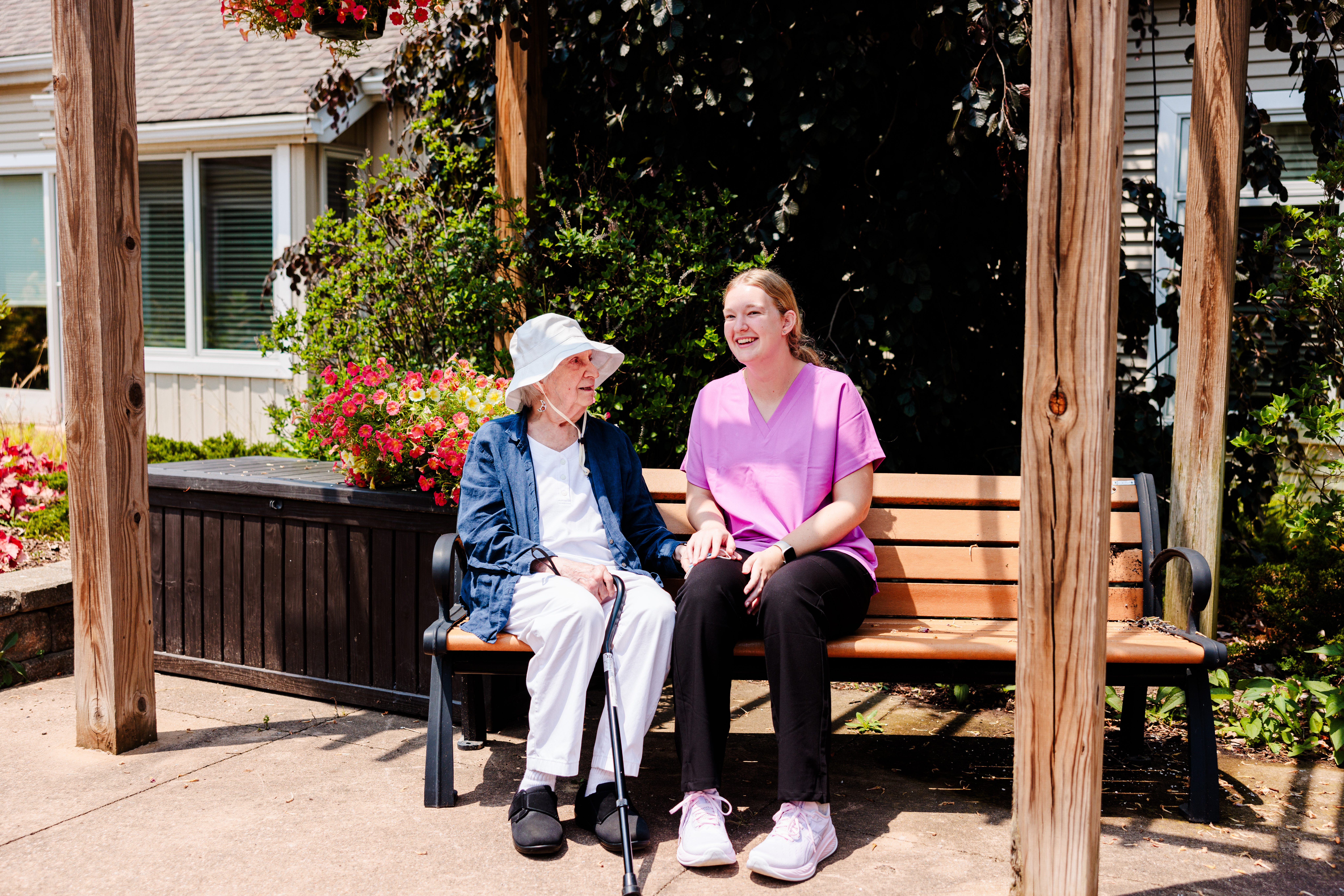Across Uncertain Ground
by Myra Orenstein | Jul. 20, 2004 | 4:00 AM
Monday morning rolls around again. You take a deep breath. There's a sense of hope today, not the dread that typically marks the beginning of your week. The family had a wonderful time last weekend with Mom. Funny how special occasions sometimes bring out the best in her. She laughed. She reminisced. She was sharp.
Now it's Monday. You pull the phone from its cradle and slowly begin dialing her number. She says hello. You hold your breath. "What a great weekend. Wasn't it great seeing everyone, Mom?" Silence. A quick, "Um ... yeah." And then the rapid change of subject. She's forgotten it all and this is her way of covering it.
She's been diagnosed with Alzheimer's disease.
An elusive foe
Alzheimer's is a progressive disease of the brain that is the most common type of dementia. According to a report issued by Forest Laboratories, more than 5.1 million Americans will have Alzheimer's disease by 2010.
Yet, the definition of Alzheimer's varies from one doctor to another, says Dr. Peter J. Whitehouse. "It is multiple things. It was named after a man so a category has been created around it." Whitehouse is director of integrative studies in the department of neurology at Case Western Reserve University and the University Hospitals of Cleveland University Memory and Aging Center.
He explains that everyone exhibits age-related changes. Alzheimer's is "part of a continuum. There is no specific test to differentiate Alzheimer's from aging. Every test has an overlap."
While definitions may vary, Whitehouse and others do agree on the warning signs of the disease. Dr. Willam Schwab, chief of geriatric medicine for Ohio Permanente Medical Group, says that forgetting the "simple things" does not lead to a diagnosis of Alzheimer's. "Everyone forgets their keys or the right words," he notes. But a patient having no recollection of significant events, such as a family get-together, might be an indicator.
Yet, Whitehouse is quick to point out that there is currently no test available on living patients to definitively determine the existence of Alzheimer's.
Dr. George Bartokis, director of the UCLA Memory Disorders and Alzheimer's Disease Clinic and clinical core director of the UCLA Alzheimer's Disease Research Center, adds that "the dead brain can tell us about Alzheimer's to a certain point, but Alzheimer's itself starts 20 years before our current criteria can establish the diagnosis."
Bartokis' research focuses on the impact of the breakdown of myelin and its role in the aging of the brain. Myelin, an insulating layer that forms around the nerves, allows rapid and efficient transmission of impulses along the nerve cells. If the myelin is damaged, those impulses are disrupted.
Myelin is like an Internet connection, according to Bartokis. Everyone has a high-speed connection until age 40 or 50. Since myelin is no longer produced after age 50, the connection begins to slow down.
If the No. 1 risk factor for Alzheimer's is age, what does myelin have to do with the disease? Everything, according to Bartokis. He says that humans are the only species that possesses myelin. We are also the only species to fall prey to Alzheimer's.
"The process of becoming a fully actualized human happens as we get older," he says. "We, by inventing medicines, have created our own problem. We have made advances in keeping the body healthy. We haven't done anything to keep our brain healthy."
But the problem doesn't stop there. "By itself, Alzheimer's will bankrupt Medicare in 20 years," he explains. "This is due in part to the baby boomer generation. There are more people growing old. We are presently spending $100 million per year. In 20 years, we'll be spending $400 million."
What can be done?
New techniques are being developed to measure myelin development and myelin breakdown over the entire age span. "Once it is measured," Bartokis says, "it can be fixed. It's all a matter of time and money.
"We could be talking about something as simple as vitamin E. The technology is there. The tools are there."
The good news, he adds, is that the FDA and the scientific community recognize that a cure or preventive measure must be found sooner rather than later. "In coming up with the diagnosis of mild cognitive impairment, they defined a risk group, not a disease," he says. "They did this so that there would be a ballpark to go to and find medicines for the early stages of the disease. Now, we're moving towards prevention."
Whitehouse acknowledges that there are drugs available to treat Alzheimer's, but he cautions against expecting to be prescribed "a magic bullet."
"Taking the face of science and having excess faith in it, thinking science will solve all problems, gives science the power of religion," he warns.
The most recent drug to enter the market is Namenda (memantine HCI). The development program for memantine was a joint effort between Forest Laboratories and Merz Pharmaceuticals, which obtained approval for memantine in the European Union in 2002. The drug was approved by the FDA last October and became available through physicians and pharmacies in January of this year. It's touted by Forest Laboratories as the first of a new class of medications for Alzheimer's disease with a mechanism of action distinctly different from previously available drugs.
In clinical trials, not only was Namenda found to be safe and well tolerated, but patients treated with Namenda scored higher on measures of cognition, daily function and performance. It is the only approved therapy in the United States for moderate to severe Alzheimer's disease.
ûharmaceutical protocols aside, Schwab suggests reorientation using reminiscent therapy. While taking someone with Alzheimer's to a circus is not a good idea because of possible overstimulation, Schwab says he believes that photographs, music and a car trip to a family dinner are fantastic.
"It helps the person focus and ultimately do better. It's important to be social and to be out," he says. Schwab also stresses the importance of exercise, proper nutrition and socialization with any elderly person.
If not Alzheimer's, then what?
Whitehouse says that problems with recent memory, recalling names, remembering where the car was parked and appointments may be due to anything from low thyroid to menopause to "senior moments."
Schwab believes that "pharmacological misadventures" may also be responsible for possible misdiagnoses. "Confusion oftentimes can be related 100 percent to medications or infections," he says. "That is the first thing that should be looked into. The clinical manifestations have to be pretty profound, but a lot of drugs have side effects. They may be the reason for predementia."
ther conditions may also exist. "People are often sent [for medical evaluation] because they are disinterested," notes Barry S. Layton, Ph.D., in the department of psychiatry, physical medicine and rehabilitation at University Hospitals of Cleveland. "They are behaviorally inert. They are unable to implement plans or have no intention to plan. They are distracted or forgetful."
Layton says that many patients don't believe they have a demential illness because they are not experiencing memory problems. "Often, dementia in older age individuals is manifested by their lack of ability to plan and other disturbances in executive functioning," he explains. "They may be overwhelmed by tasks which require more than one step."
Spouses will gradually fill in, taking over chores or repairs until the patient is gradually contributing little or not at all. "It's sometimes imperceptible until there's a big event," Layton says. "The person may become behaviorally inert. This could be an organized person who previously would organize repairs or family plans."
hese could be signs of dementia — or depression. Layton explains that a depressed person may not accomplish tasks for which they are still cognitively capable. "If someone is diagnosed with dementia, it is important not to write off the emotional component," he advises.
nce again, there is good news. Many times, depression can be treated with similar medications to those used for the younger population. Stimulants may enhance activity and cognitive ability. However, he cautions, as does Schwab, that "all medications may have different kinds of effects than those we are used to in young people."
lizabeth Dreben, Ph.D., a rehabilitation psychologist in the department of medicine and rehabilitation at MetroHealth Medical Center, also warns that a diagnosis of depression may not always be appropriate or accurate. She believes that asking the right questions is crucial.
"Ask questions other than •Are you depressed?' Ask •Are you discouraged? Are you down in the dumps?' These type of questions are much less stigmatizing," she says. "They're less scary because they are not diagnostic sounding." She adds that a stigma persists among the elderly regarding a diagnosis of depression.
Once appropriate questions are posed, Dreben has discovered that the diagnosis is often not depression but Dysthymic Disorder. The difference between the two is explained in the "Diagnostic and Statistical Manual of Mental Disorders": "Usually, Major Depressive Disorder consists of one or more discrete episodes that can be distinguished from the person's usual functioning, whereas Dysthymic Disorder is characterized by chronic, less severe depressive symptoms that have been present for many years."
"Hearing that the diagnosis is dysthymia makes it not that bad," Dreben says. "More people relate to the fact that it is not full-blown depression."
Other possibilities exist as well. A person who has recently suffered a stroke may be able to cope with the physical changes, but have difficulty handling day-to-day activities.
"They are struggling to adjust to obvious changes," says Dreben, adding that Adjustment Disorder would be a more appropriate diagnosis in this instance.
Treatment options
Typically, antidepressants would be prescribed in any of the above situations. Beyond drugs, Dreben says that, as a psychologist, she also emphasizes helping stroke victims and others feel as if they can be in control of their lives. "We focus on what they are able to do," she says. "We promote rehabilitation so that they may become independent and get back to business and feel more capable."
Whitehouse says that not only independence but wisdom is a factor in maintaining positive mental health. Intergenerational education is part of the curriculum at a charter school at Fairhill Center that he owns and operates with his wife, Catherine. Now in its fourth year, the school encourages the elderly to read, garden and go on field trips with the young students.
"Engaging older people is a benefit to the students," Whitehouse says. "Wisdom should be brought back into conversation. There is a need to reinvent aging. We are taking the psychosocial, cognitive-enhancement route. The school is about collective wisdom."
Trending
-
1
-
2
-
3
-
4
-
5










